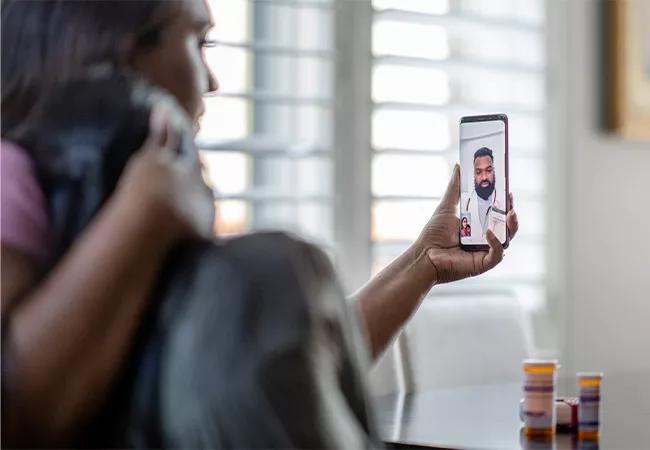How virtual visits for clinical trials and peer-to-peer support can improve access and care

Well before the start of the pandemic, Cleveland Clinic Children’s was leading virtual care and programming for adolescent and young adult (AYA) patients facing a cancer diagnosis. This existing infrastructure enabled a seamless shift and uninterrupted care for thousands of pediatric patients.
Advertisement
Cleveland Clinic is a non-profit academic medical center. Advertising on our site helps support our mission. We do not endorse non-Cleveland Clinic products or services. Policy
Stefanie Thomas, MD, MS, a pediatric oncologist and Director of the Adolescent and Young Adult Oncology Program at Cleveland Clinic Children’s, says there is a need for services in the virtual space to reach more patients, particularly those with rare cancers. Since Dr. Thomas joined the team in 2019, her clinical and research practice has focused on improving care and access for AYA patients at every point in their care journey.
In 2018, she led a study that assessed the rates of clinical trial enrollment in a group of pediatric and AYA cancer patients. Study findings, published in Cancer, suggest that significantly fewer AYA patients were enrolling in cancer clinical trials than children. These findings contradict conventional thinking that attributes trial existence and availability as barriers to participation.
Leveraging virtual visits for clinical trials is a valuable tool to reach this patient population, argues Dr. Thomas. She recently presented best practices on this at a 2021 ASPHO Conference, sharing the following tips to maximize the virtual visit:
“We are one of only a few centers in the country offering clinical trials for new, innovative drugs. That means we have patients who come to us from all parts of the country, usually for a very specific trial. It’s essential that the patient and/or their guardian, really understands the goals and eligibility requirements of the trial before they spend time and money traveling to Cleveland,” she says.
Advertisement
A thorough assessment helps providers discuss the trial, understand the patient’s medical history and manage expectations with the patient and family. For patients who have been enrolled in longer-term oral medication-related studies, this format has allowed the team to do virtual check-ins, rather than having them come to the hospital.
The AYA program has also ventured into peer-to-peer community support through a virtual platform. Pre-pandemic planning for in-person programming transitioned to a virtual model in early 2020. Taylor Buss, MSW, LISW-S, pediatric and AYA Oncology Social Worker, oversees these programs.
She facilitates two virtual cancer chats for teens age 13 to 17 and young adults age 18 to 29, respectively. The latter is open to any young adult diagnosed with cancer and is not limited to patients being treated at Cleveland Clinic Children’s.
“Some patients are more comfortable accessing these chats from the comfort of their bedrooms. Coming into the hospital can be understandably burdensome, even triggering, for some patients.”
At the end of the day, it’s about building a community, says Ms. Buss. The offerings continue to evolve based on direct feedback from patients, she says. For example, they decided to reframe the virtual meet-ups as “cancer chats,” rather than “support groups.” Participants wanted something that felt less like therapy and more like a community, so, they are now hosting events like a virtual game night in partnership with community organizations.
Advertisement
In-person care and in-person community are both extremely important and are not going away. But, Dr. Thomas stresses, it’s important to also recognize the value of standardizing virtual options for select patients, even outside of clinical trials and peer-to-peer social support.
“Some patients don’t need to be physically present to receive their care, and we should recognize that and honor their desires, particularly in cases when they may be receiving bad news.”
Dr. Thomas does caution that moving forward, it will be important to consider how multidisciplinary care teams for AYA cancer patients can be incorporated into the virtual space.
“We need to make sure that the whole care team, including, for example, nurse coordinators, social workers and psychologists, remain integral to the management of care.”
Advertisement
Advertisement

Radiation therapy helped shrink hand nodules and improve functionality

Standard of care is linked to better outcomes, but disease recurrence and other risk factors often drive alternative approaches

Phase 1 study demonstrates immune response in three quarters of patients with triple-negative breast cancer

Multidisciplinary teams bring pathological and clinical expertise

Genetic variants exist irrespective of family history or other contributing factors

Study shows significantly reduced risk of mortality and disease complications in patients receiving GLP-1 agonists

Structured interventions enhance sleep, safety and caregiver resiliency in high-acuity units

Addressing rare disease and challenging treatment course in an active young patient